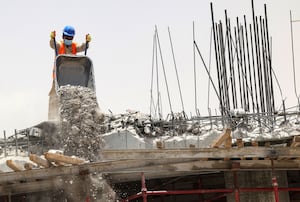Job growth in the UAE in the second quarter outpaced Saudi Arabia, driven by strong demand in real estate, financial services and technology sectors, the introduction of a digital work permit system and high employer confidence, a report by recruitment company Cooper Fitch has shown.
Hiring activity in the Emirates accelerated by 4 per cent for the three months to the end of June, while job growth in the kingdom rose by 2 per cent, according to Cooper Fitch’s Gulf Employment Index report.
Saudi Arabia recorded steady hiring across finance, tourism and infrastructure, although momentum slowed slightly as organisations reassessed budgets and project timelines, the research found.
“The UAE had a significant import of high-net-worth individuals, millionaires and billionaires. We're also seeing a lot of SME activity happening in the jobs market here. A lot of sectors in the UAE are growing well simultaneously,” Trefor Murphy, founder and chief executive of Cooper Fitch, told The National.
“Legal in-house, public sector, infrastructure [roads and rail], education, tourism, supply chain, sales and marketing are other sectors in the UAE recording robust hiring activity.
“Saudi Arabia is repositioning themselves and working on projects that have specific timelines attached to them, such as the AFC Asian Cup and Expo 2030, among others. They've a huge amount of infrastructure they need to do to be prepared for those big global events.”
There is also a shift from hiring of “strategic, visionary type” roles to “execution roles” in the UAE, he added.
The UAE is facing a surplus of skilled professionals in many roles, particularly at middle and senior management levels, according to recruitment experts. The country’s attractive lifestyle and tax-free salaries continue to draw skilled professionals from around the world.
The Emirates' population is booming and job seekers in many professions now far outstrip the number of available roles, HR professionals said. People are coming in and taking jobs for very low salaries just to get their foot in the door, they added.
Employers are placing greater emphasis on UAE market experience and cultural fit, as well as soft skills, given the abundance of technically qualified candidates.
Overall hiring in the GCC rose by 1 per cent in the second quarter, Cooper Fitch said. Oman registered a 2 per cent growth in hiring activity driven by expansion in the renewables, manufacturing and industrial development sectors.
Employment creation in Bahrain increased by 1 per cent, led by FinTech and tourism. However, a smaller talent pool and limited project scale continued to temper broader hiring momentum, the consultancy reported.
Qatar and Kuwait both saw reduced hiring in the second quarter, with contractions of 3 per cent and 4 per cent, respectively.
“In Qatar, employers reassessed short-term hiring plans due to slower momentum in energy and infrastructure projects, particularly around the North Field expansion. However, long-term hiring intent remaining intact,” the report said.
“Kuwait’s hiring activity remained subdued, with many employers deferring decisions amid ongoing policy discussions and the absence of new project approvals.”
Watch: Why expat salary packages are not what they used to be
With both Eid Al Fitr and Eid Al Adha falling in the second quarter, along with the early summer slowdown, many organisations delayed decision-making, particularly in markets with large public sectors or family-owned businesses, according to Cooper Fitch.
Countries advancing project delivery saw hiring growth, while others slowed amid delays in spending, the consultancy said.
Roles in demand in Gulf
Senior finance roles notched the highest growth in the GCC this quarter, up by 8 per cent, driven by the formation of new joint ventures and increased regulatory oversight. Internal audit and compliance hiring surged, particularly in Saudi Arabia and the UAE, Cooper Fitch research found.
Broader finance recruitment also rose 4 per cent, fuelled by a “sustained appetite” for financial planning and analysis specialists and treasury professionals.
GCC financial hubs, particularly the Dubai International Finance Centre and ADGM, experienced a 2 per cent increase in investment-linked hiring, as “global fund inflows intensified the competition for top-tier compliance, risk and regulatory professionals”, according to Cooper Fitch.
In banking, hiring activity grew by 3 per cent, led by demand for professionals who straddle governance, automation and data.
Strategy hiring, aligning recruitment with long-term business goals, remained flat as companies increasingly favoured interim consultants or niche specialists over traditional firms, the consultancy said.
founder and chief executive, Cooper Fitch
“Leadership hiring in the chief executive practice increased by 4 per cent, driven by mandates related to restructuring, digital redesign and new market expansion,” according to Cooper Fitch.
“Public sector hiring grew 5 per cent underpinned by sustained investment in digitalisation and citizen services. HR hiring rose by 4 per cent in the GCC, largely fuelled by nationalisation mandates and large-scale workforce mobilisation across utilities, energy and industrial sectors.”
Sales and marketing hiring grew by 6 per cent, driven by strong activity in real estate, manufacturing and consumer markets. Real estate hiring increased by 1 per cent, supported by key project delivery milestones and a rise in developer activity, particularly in Abu Dhabi, the report said.
Legal hiring was mixed: in-house counsel demand rose by 7 per cent, especially within investment and real estate firms, while private practice hiring contracted by 3 per cent.
Hiring in manufacturing increased by 2 per cent, driven by new plant developments and upgrades across steel, power, packaging and chemicals. Supply chain hiring rose 3 per cent. Roles linked to automation, vendor management and logistics transformation gained traction, the report found.
In technology, software jobs contracted by 2 per cent, while cloud hiring declined by 3 per cent and cybersecurity hiring rose by 3 per cent. Digital, data and AI hiring increased by 4 per cent in the GCC.


